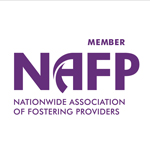Fostering as a Family – the highs, the lows and some tips to make it a success

Making the decision to foster as a family takes a lot of thought and discussion. There is no doubt it can be challenging but it can also be massively rewarding and beneficial to everyone involved – to the foster carers, foster children and children of foster carers.
At Chrysalis we know that ensuring the happiness and well-being of your birth children will be your absolute priority, as well as that of the children who you foster, and we are here to support you on that journey as your children are really important to us too!
Let’s take a look at some of the challenges and benefits that fostering offers to families, and some tips to help it be the most positive experience for everyone involved!
Challenges for children of foster carers:
- Sharing: Birth children may find it difficult to share their belongings, parents’ time, and affection with the foster child.
- Behaviour mimicking: Birth children may witness inappropriate behaviour from the foster child and begin to mimic them.
- Culture: If the foster child is from a different religion or culture, it could be a challenge for birth children who have no experience in this area.
- Inconsistency: Fostering involves a variety of different fostering placements, which can provide inconsistency to birth children.
Some of the potential benefits to birth children:
- Learning to share: sharing is an important life skill for everyone, and it helps children form bonds and friendships. Not only is this great for birth children, but it also goes a long way in helping foster children feel welcome and part of a loving family.
- Friendship: it’s fantastic to see foster children being accepted by the birth children of foster carers, but it’s even more special when close friendships are formed. These friendships can last beyond the foster child’s placement, too.
- Empathy: living with another child who has experienced significant trauma can teach young people a lot about empathy. They can learn to be more understanding and considerate of others, which gives them enhanced social skills.
- Life skills: some birth children of foster carers go on to become foster carers themselves or enter caring professions.
It is important to note that the impact of fostering on birth children can vary depending on the individual child and family circumstances. However, with the right communication, planning, and support, fostering can be a rewarding experience for everyone involved.
Top tips to help ensure that you and your family have a positive experience of fostering:
- Be upfront and honest about fostering- Your birth children need to be involved in all the conversations around your decision to foster. Fostering affects birth children in many ways, so they need to know how their lives will be impacted. There are a lot of unknowns with fostering and it’s not always pretty, so don’t sugarcoat anything. The more information they have, the better.
- Dedicate time for birth children- Fostering is a full-time job, but it’s vital you commit to spending one-on-one time with your biological children. The last thing you want to do is make them feel excluded from their own family.
- Have open communication- Fostering a child isn’t always plain sailing, and issues are bound to arise. Make sure your birth children know they can reach out to you to discuss anything that’s bothering them. This kind of relationship empowers them to discuss their feelings, which in turn helps them find a solution. Utilise support from us at Chrysalis too, make sure your children know that they can speak to us anytime about anything they are finding hard.
- Maintain good behaviour- To prevent your birth children copying any challenging behaviours, be honest with them about the types of upbringings the children in your care are likely to have had, and why this means they may have social or emotional issues. Explain that the behaviour is not acceptable and they’re not allowed to copy it, but that you’ll be working with the foster child to help them through their struggles, which can take time.fost
- Build healthy relationship- Hopefully, most children will find common ground through a shared interest, toy or game, but every child is different! To make sure the foster home is a healthy environment for everyone, you’ll want your birth children and foster children get off to a good start. Facilitate this through activities, encouraging them to play and talking together as a family.
You can read a beautiful and honest account of a birth child and her sibling’s experience of fostering here: This sister is mine | Family | The Guardian
As part of Children of Foster Families month we will be sharing more resources and celebrating our amazing families who foster but we would love to hear your feedback too.
To find out more about the Chrysalis Approach and the support our Children and young people receive.
#thechildrenoffostercarers #fostersiblings #childrenandyoungpeople #fosteringuk #fostercare @thefosteringnetwork
To find out more about the Children of Foster Carers month visit The Fostering Network.



